| Article ID | Journal | Published Year | Pages | File Type |
|---|---|---|---|---|
| 6257088 | Behavioural Brain Research | 2015 | 7 Pages |
â¢Sleep deprivation altered the levels of the AMPA and NMDA receptor subunits.â¢Sleep deprivation impaired rat spatial working memory in the T-maze task.â¢The rat emotional function in open field test was not affected post sleep deprivation.
Hippocampus-dependent learning memory is sensitive to sleep deprivation (SD). Although the ionotropic glutamate receptors play a vital role in synaptic plasticity and learning and memory, however, whether the expression of these receptor subunits is modulated by sleep loss remains unclear. In the present study, western blotting was performed by probing with specific antibodies against the ionotropic α-amino-3-hydroxy-5-methyl-4-isoxazolepropionic acid (AMPA) receptor subunits GluA1, GluA2, GluA3, and against the N-methyl-d-aspartate (NMDA) glutamate receptor subunits GluN1, GluN2A, GluN2B. In hippocampus, down regulation of surface GluA1 and GluN2A surface expression were observed in both SD groups. However, surface expression level of GluA2, GluA3, GluN1 and GluN2B was significantly up-regulated in 8 h-SD rats when compared to the 4 h-SD rats. In parallel with the complex changes in AMPA and NMDA receptor subunit expressions, we found the 8 h-SD impaired rat spatial working memory in 30-s-delay T-maze task, whereas no impairment of spatial learning was observed in 4 h-SD rats. These results indicate that sleep loss alters the relative expression levels of the AMPA and NMDA receptors, thus affects the synaptic strength and capacity for plasticity and partially contributes to spatial memory impairment.
